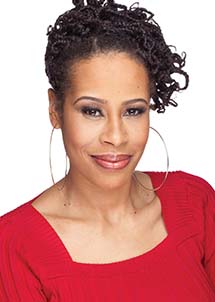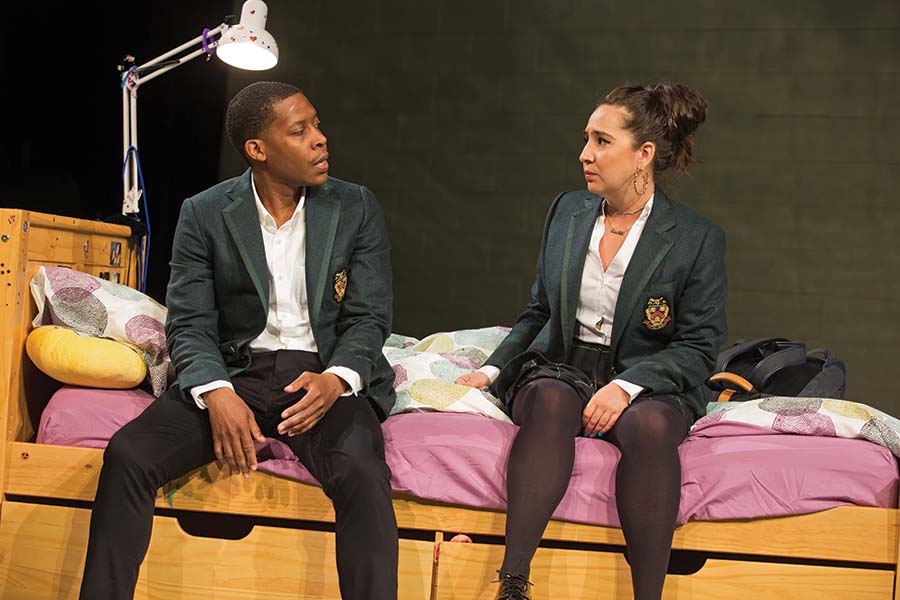In Dominique Morisseau’s drama Pipeline (the full script of which is published in the December 2017 issue of American Theatre), Nya, a high school teacher at a New York City public school, wrestles with the realization that her teenaged son, Omari, though enrolled in a private school in upstate New York, may be in danger of straying into the “school-to-prison pipeline” that ensnares so many young men of color. Morisseau spoke to Kamilah Forbes, a frequent director of her work (though not Pipeline) and executive producer of the Apollo Theater, about the play and her inspirations.
KAMILAH FORBES: Pipeline is so reflective of what’s happening in our school systems all across the country. What was the spur to this topic for you?

DOMINIQUE MORISSEAU: I was reading the Michelle Alexander’s The New Jim Crow, and I was really struck by the school-to-prison pipeline, and what it means to have people go straight from school right into prison—how you can systemically create that kind of structure, so that it’s not just individual, it actually becomes a way of socializing our community. I think that’s about policy. We put a lot of blame on public schools and public school teachers, but every time we call a teacher a failure, I’m saying: Who failed the teacher? Because everything has a trickle down.
One of the striking things in your work is the depth and breadth of the voice of your characters. I’m curious: Do you hear the character’s voice first, or do you hear the scene around the subject you’re trying to illuminate first?
That’s a good question. At first, I go: What am I interested in exploring? So if I’m interested in exploring a topic or issue—not just random ideas and topics, but things that move me, where I can’t sleep, and I’m wrestling with something internally that I haven’t found quite all the words to express how I feel about it. Then I go: Well, okay, if I want to talk about the school-to-prison pipeline, who do I want to explore this story through the eyes of? With Pipeline, I knew I needed a teacher, I needed a mother; so it could be a mother/teacher. That’s easy, that’s what I know very well.
It surprised me when I realized her son went to a private school. I didn’t figure that out until the second scene. Some plays, I have a big chart or a map; I think I know where I’m going. This wasn’t that at first. I kept surprising myself. Like Omari, I just kept going, and by scene five or whatever, he was running away. But then I’m like, “Well, is he going to come back? I want to see him. I need to see him.” I just go scene by scene, as an audience member of my own work.

I knew it was a mother and a son, but I didn’t know I was going to see the father. And then as they talked about him, I thought, I need to see him. I want his side of the story. I don’t want to just talk about an absent father like this typical, clichéd thing. I really wanted to see who we’re calling an absent father. And this absent father doesn’t believe he’s an absent father at all, actually. He feels like a present father, so then it’s about our definitions of absence.
That’s right. I caught myself in that moment—because we didn’t see the father until when we did, I had made up a story of who and what he was before we even saw him. I said, “Oh my gosh, this is a slick device the playwright has us on—it has us questioning our own biases.” That’s a device you use a lot, and I almost want to say: Why do you do that to us? There’s so much gray. What is your fascination with the gray?
You crack me up! I have no idea why I do that. [Laughs] All I can say is it’s how I hear human conversation—or how I hear what’s underneath our attempts at finding our connection as humans. We’re almost finding ourselves in our ways of trying to understand other people. I think human beings are freaking interesting—how we handle conflict. I’m seeking effective ways of handling conflict in my own life, so I’m fascinated with how we do that. I think it’s about power and being willing to surrender power, or what the true onus of power really means.
I find it fascinating that, for someone who’s so resolute in her political stance on a myriad of issues, you are still able to balance the nuance—to basically not pick sides with your characters. You love them all fiercely. Why is that? I would think that it would get so difficult. I would immediately begin to place judgment on whether it’s the father’s or the mother’s fault or the other teacher’s fault.
It’s challenging, but with my characters, it’s a world that I’ve already been interested in exploring. Even if I don’t agree with everything everybody does in my plays, I do love them, because I’m trying so hard to understand them. Because they reflect our world, and I want to make the world better. I truly—even though it sounds so Pollyanna, and that’s not me—I really do think the better human being I can become, the better writer I can become, and vice versa. I’m doing it better in the work than I am in real life, but I’m striving.
You’re doing it, girl. I can attest.
It’s funny. When I was in elementary school, I had this debate class. I had to debate gun control; I was pro-gun control and my opponent was supposed to be anti-gun control, but I don’t think that she understood the assignment, because she kept arguing for gun control with me, and I was so bored by the conversation. I was like, “She’s not even counterpointing me!” I clearly got an A, because she did not do her side of the thing, but it was making me so mad. So I think I am ignited by debate, and I like a worthy opponent. I like to see things from all ends, if only to just strengthen my own ideas. But when I don’t get that pull on the other side, it’s a real drag.
Girl, you was ready for a fight.
She took away my moment to shine!
That’s ultimately what your work becomes, right? It becomes this internal push and pull, this tug of war of characters, of ideas, of nuance, which ultimately it helps paint a fuller picture of our own humanity.
And conversation around the work is the next part of the work. I’m sorry, I don’t mean to throw David Mamet under the bus right now (but sort of I do), but I’m a community-driven artist, so my work will never be just for me or just for people to witness and not be able to respond to.
You’re saying the conversation that the work spawns is just as important as the work.
Absolutely. I tell people, you can talk about me behind my back all you want to. That’s your right. I have to protect myself—I don’t need to hear all of it—but once you’ve experienced the play, you have every right to discuss it, or it’s not a fair exchange. I come from mentors who say the best plays do more asking of questions than they do answering them. So when I go, “I’m going to ask some questions,” I got to then let the people answer them, or what am I asking for? It’s very—excuse my language—masturbatory to just sit around and ask a bunch of rhetorical questions. I don’t need for anybody else to be in the room to do that. If I’m going to ask questions, I need to let people have answers at some point.
With Pipeline, there was a lot of post-show conversation and community engagement. What was the most surprising response you got from this work?
Young teenagers and young people who were transitioning back into society from having been incarcerated, women and men but mostly young men, who could all be Omaris. They would say things to me like, they’ve never felt so understood by an adult before, or they wish their mother could have seen this play with them, because it would have changed their relationship dramatically for the better. That kind of stuff was surprising and affirming. I maybe expected young people to relate to certain moments or to have some kind of critical eye on the entire journey of the story, but I didn’t expect them to have such a cathartic experience with the young characters.
One thing I love about your writing is that there’s a fascination with a scene, a community, that threads its way through. With Pipeline, it’s simple to say that it’s about the failure of the education system. But am I wrong to think you’re not convinced by the education system—that we place too much faith in it?
As an educator, I’ve never really done well with systems. I’ve worked in public schools, I’ve taught in private schools, I’ve worked in not-for-profit. I love students, but I don’t always love the powers that be that sort of police your ways of engaging your students. And I expect at some point that if I want to participate in education again that I’ll have to eventually find my own route to it under my own rules.
But I do believe in equality in education, and I believe in supporting public schools and giving them the resources that they need to be able to be successful for our young people. That’s where I think there’s been a failure in policy, around how we support public schools in cities, and we blame administrators who are low on resources for failures. I know some very shady things happen in public schools, so I’m not like, “This is all good.” But I think if the critique is not happening from a place of inside information, if it’s happening from a very removed place—I don’t see how you can serve anyone from a distance. You can’t serve young people from a distance. You got to get your hands dirty. You got to get right up in there with them if you’re going to want to be of service to them. Everything else is just fluff and air, and the kids see through that right away.


